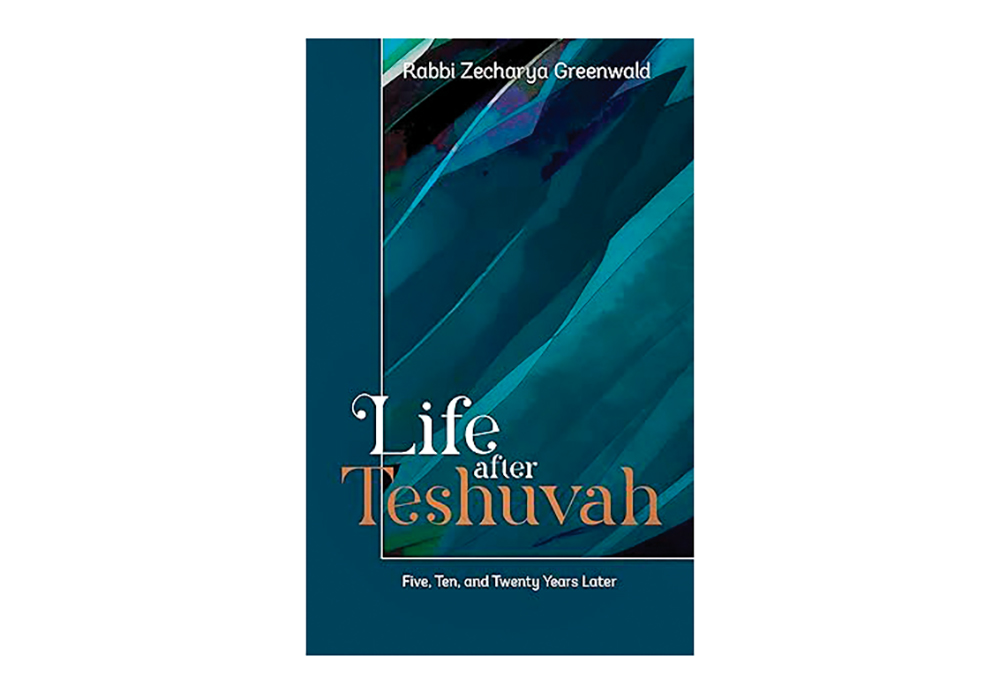
Reviewing: “Life after Teshuvah: Five, Ten, and Twenty Years Later,” by Rabbi Zecharya Greenwald. Mosaica Press. 2024. 405 pages. ISBN-10: 1961602296.
A more appropriate title for Rabbi Zecharya Greenwald’s remarkable new book “Life after Teshuvah: Five, Ten, and Twenty Years Later” (Mosaica Press) might be “Life after Teshuvah: Read It and Weep.” For many, if not all, returnees to Judaism, their path back to tradition and observance has included numerous faux pas that they later come to regret.
While the modern baal teshuva (BT) movement has existed for over half a century, this is one of the few books that show the reader how not to alienate those closest to them as they proceed down their path of observance.
Rabbi Greenwald is a close student of the late, great Rav Shlomo Wolbe. Rav Wolbe had a profound and keen understanding of the human condition and was a man of great genius and deep common sense. Shtick was anathema to him, and his sage advice is found in every chapter of the book.
Rabbi Greenwald has been involved in education for many decades and has worked with thousands of students. The road to Judaism can often be challenging for both those returning to it and those who never left it. For those who were his students, his guiding hand was likely a soothing balm. For those who were not, the book can do that for them.
Many people’s challenge in returning to observance is that their initial relationship to Orthodoxy might be akin to a honeymoon. But a few years later, a different reality may emerge. For many, there is significant disappointment and disillusionment. This often manifests itself when trying to get their children into specific schools, when shidduchim or the lack of them are suggested, and more.
The author doesn’t shy away from the problems or attempt to sugarcoat things. He shows the reader how to make the best of the situation and how to fine-tune their spiritual antennas to the new reality they are living in.
He writes that many returnees do not have the fine-tuned perception or experience to know what is acceptable in their new environment and what is not. He details scores of stories of returnees struggling with situations related to marriage, finance, mental health, schools and more.
Rabbi Greenwald makes a particularly astute observation that children’s attempts to improve their parents’ religious observances often end in disaster. This is true for the BT as well as the FFB (frum from birth). It doesn’t work because it is the parents’ job to teach their children how to live, not the reverse.
It’s not that children can’t improve their parents’ religious levels. Rather, it can’t be done in the manner that many of them often do it, via preaching and admonition rather than from example.
Rabbi Greenwald says he learned from Rav Wolbe that the only way to fulfill one’s responsibility to teach one’s parents is through example. The children need to be the kind of people that other Jews will look at and say, “That’s a good way to live.” If they see it, then their parents might recognize it as well.
The oft-quoted verse from Malachi 3:24 states, “He will turn the heart of fathers to their sons, and the heart of sons to their fathers.” But Rabbi Greenwald writes that one needs to take a closer look at the verse. It says that children will draw their fathers’ hearts to God. It does not say that they will teach their parents. They must inspire, not preach.
While the book is geared to the baal teshuva, the author’s pearls of wisdom extend to everyone. For example, on the subject of helping your child in school, he writes that if you can’t learn with your child without becoming angry and frustrated, then don’t even try to do it. This is particularly relevant when it comes to Gemara learning, which can be an extraordinarily exasperating endeavor.
So much so that Rabbis Aaron Spivak and Yakov Horowitz wrote the “Bright Beginnings Workbook” series, meant for students new to Gemara study (be they 10 years old or 50), so that after mastering the basics, they will find it an enjoyable yet challenging experience, as opposed to a bewildering one.
Everyone struggles with life’s challenges, doubts, and often unanswerable questions. For the baal teshuva, this is particularly difficult given their transition between two different worlds.
Rabbi Greenwald has written a brilliant guide that addresses those challenges and doubts here. There’s no softening or denial of the dilemma; rather, it’s an honest and straightforward attempt to use Torah wisdom to make that transition easier.
Ben Rothke lives in New Jersey and works in the information security field. He reviews books on religion, technology, philosophy, and science. Follow him on Twitter at @benrothke. His new book was recently published: “The Definitive Guide to PCI DSS Version 4: Documentation, Compliance, and Management.”








